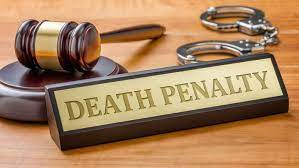By Musa Paul Feika
Since the Sierra Leone People’s Party (SLPP) led government under President Julius Maada Bio abolished the death penalty, there has been a rise in the rampant and unlawful killing of Sierra Leoneans by the state’s security apparatus, especially the Sierra Leone Police (SLP) force and the Republic of Sierra Leone Armed Forces (RSLAF) personnel. The situation is still getting worst like the recent brutal killing of Providence International High School student, Gillis Edward Ola Johnson, by a school pupil, Mohamed Aruna Conteh in Freetown. This incident, more than any other, is one of the clearest indications of the alarming rise in unlawful killings in Sierra Leone.
According to principal of the said school, the victim, Mohamed Aruna Conteh was expelled including his friends, whose names were not mentioned, by the school administration. Though the abolition of the Death Penalty was one of recommendations by the Truth and Reconciliation Report (TRC) published in 2004, but again looking at the two sides of the coin and considering the atrocities under the incumbent SLPP such as the killings at Makeni, Tombo, Lunsar, the 10 August protest and the Pademba Road attempted prison break / assassinations, though fingers were pointed at President Bio and his government, nobody was brought to book.
Many Sierra Leoneans have revealed that the aforesaid incidents reminded them of the eleven years of civil conflicts in Sierra Leone. In August 10, 2022 Sierra Leoneans were protesting against the badly shattered and battered economy, the worst in the history of Sierra Leone, under the President Bio and his failed SLPP government.

Though the House of Parliamentary set up a committee headed by one of our prudent legal practitioners in Sierra Leone, Emmanuel Saffa Abdulai to probe into some of the killings, especially the August 10 demonstrations that took the lives of many Sierra Leoneans, nobody has been brought to book or even questioned.
Rather, the Sierra Leone Police (SLP) force personnel arrested some members of the All People’s Congress (APC) and President Julius Maada Bio seriously accused the opposition members for the insurrections against his government. Sierra Leone joined the long list of nations that no longer use punitive state justice to deprive the lives of those found guilty of committing felonious offences including murder and treason. But as President Bio expunged the death penalty from the country’s law books, it has invited the Spirit of Death to Sierra Leone, resulting in an increase in unlawful killings and assassinations.
President Bio replaced the penalty with life imprisonment lasting at least thirty (30) years, which is not enough looking at the gravity of such a crime. The head of Sanctuary Praise Church situated at No. 2 King Harman Road in Brookfields, Freetown, evangelist Victor Ajesafe in his message said he was not in support of the cancellation of the death penalty from the country’s law books, adding that instead there should be a maximum sentence. He said this is because the withdrawal of the law from Sierra Leone’s law books has brought the Spirit of Death in Sierra Leone. The Holy Bible made it very much clear in Genesis 9:6 that “Whoever sheds human blood, by humans shall their blood be shed; for in the image of God, God made mankind”; meaning, if anyone sheds the blood of man, by man shall his blood be shed, for God made man in his own image. During the expunging of law, President Bio said “Sierra Leone is civilised nation, and that we shall not, and never again execute any person in this sovereign republic. I have made a solemn commitment to uphold, promote, and protect the lives and rights of every citizen.
But since then unlawful killings have been on an alarming increase across Sierra Leone. Though over the years Sierra Leone has been criticised by human rights advocates for not abolishing the death penalty from the law, and though the last executions that were carried out happened more than 20 year ago, which sentences are usually commuted to life imprisonment, in 1998 twenty-three (23) soldiers were executed by firing squad at the height of the eleven year civil war.
Since then the death penalty had continued to be an issue. But its abolition has resulted to the nation seeing a rise in unlawful killings, as if Sierra Leoneans are more emboldened to murder their kinfolk as spending 30 years in prison is far much better than being put to death.


